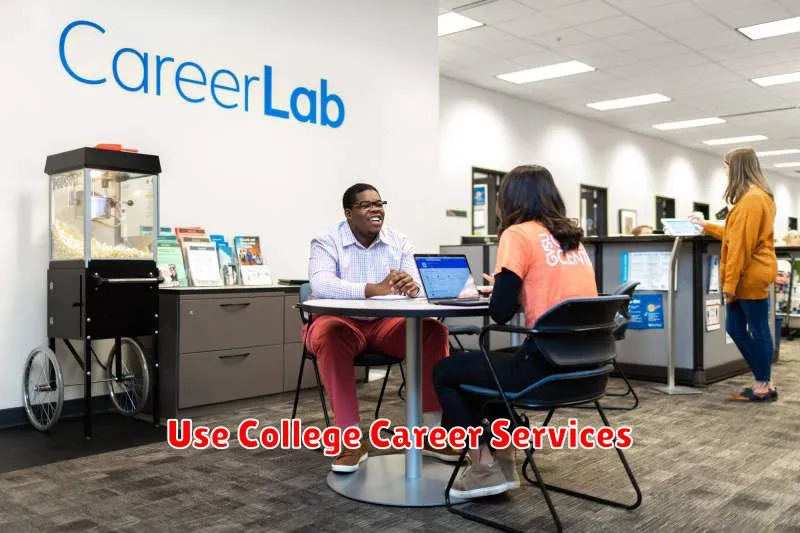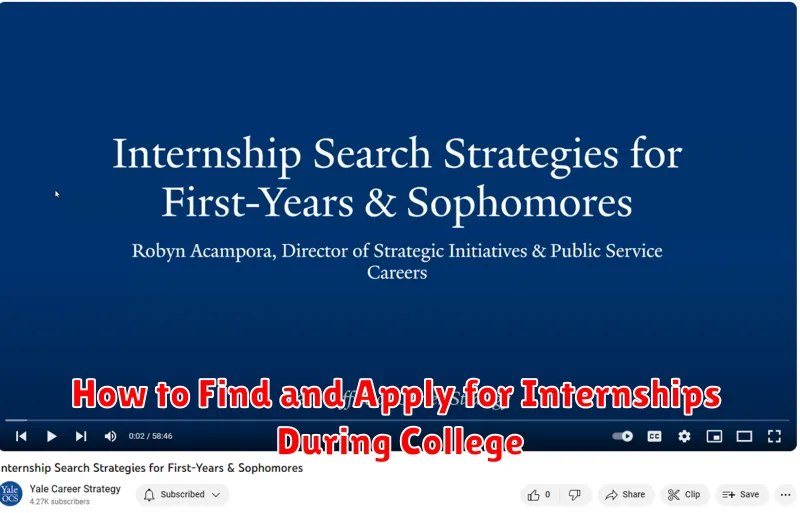Securing an internship during college is a crucial step towards a successful career. Internships provide invaluable experience, allowing students to apply classroom knowledge to real-world settings, develop professional skills, and build their networks. This article serves as a comprehensive guide on how to find internships and navigate the application process effectively. Learn how to identify internship opportunities that align with your career goals, craft a compelling resume and cover letter, and excel in internship interviews. Whether you are a freshman just starting your college journey or a senior preparing for graduation, understanding the internship search and application process is essential for maximizing your career prospects.
From exploring different internship platforms and utilizing college career services to mastering the art of networking, this guide will equip you with the tools you need to secure a valuable internship. We will cover strategies for researching companies, tailoring your application materials, and showcasing your skills and qualifications effectively. By following the advice and tips provided, you can increase your chances of landing an internship that will provide you with the experience and connections necessary to launch a successful career after college. Gain a competitive edge by understanding how to effectively apply for internships that will propel you towards your professional aspirations.
Start Early and Define Your Goals
The internship search process takes time. Begin researching potential internships as early as your freshman or sophomore year. This provides ample time to build necessary skills and explore various career paths.
Define your goals. What do you hope to gain from an internship? Which industries interest you? Knowing what you want helps narrow your search and target relevant opportunities. Identifying your objectives early allows you to tailor your academic choices and extracurricular activities accordingly.
Use College Career Services

Your college career services office is a valuable resource in your internship search. Career advisors can provide personalized guidance on resume and cover letter writing, interview skills, and internship search strategies.
They often host workshops and networking events specifically for internships. They may also have a database of internship opportunities and connections with employers who recruit on campus. Take advantage of these services! Meeting with a career advisor early in your college career can help you plan your internship search effectively.
Search on Reputable Platforms
Begin your internship search on established platforms known for connecting students with legitimate opportunities. College career services websites are an excellent starting point. They often curate listings specifically for their students and alumni.
General job boards with strong internship sections can also be valuable. Look for filters that allow you to refine searches by industry, location, and internship type. Finally, consider industry-specific job boards if you have a targeted career field in mind.
Network with Professors and Alumni
Networking is a powerful tool in the internship search. Professors often have connections with companies or know of available opportunities. Attend office hours and speak with them about your career goals and internship interests.
Alumni are also a valuable resource. Your college’s alumni network can connect you with graduates working in your field of interest. They can offer insights into company cultures, internship experiences, and potential openings. Reach out and politely inquire about informational interviews or their career paths.
Tailor Your Resume for Each Role
One common mistake students make is using a generic resume for every internship application. Customize your resume to highlight the skills and experiences most relevant to each specific role. Carefully review the internship description and identify the key qualifications.
Prioritize the information on your resume to reflect those qualifications. If a specific software program is mentioned, for example, and you have experience with it, make sure that is clearly presented on your resume. This demonstrates your suitability for the specific internship and increases your chances of getting an interview.
Write Personalized Cover Letters
A strong cover letter is crucial for internship applications. Never submit a generic cover letter. Each cover letter should be tailored to the specific internship and company you’re applying to.
Highlight relevant skills and experiences that align with the internship description. Showcase your enthusiasm for the specific industry and company. Briefly explain why you are a good fit for their team.
Follow Up with Applications
After submitting your applications, don’t just sit back and wait. Proactive follow-up is crucial.
Give recruiters a week or two to review applications before reaching out. A polite email inquiring about the status of your application can demonstrate your continued interest and keep your name at the forefront of their minds.
Be respectful of their time and avoid excessive follow-up.
Be Ready for Interviews
Once you’ve submitted your applications, prepare for potential interviews. Research the company and the specific internship role thoroughly. Understanding their mission, values, and projects will help you tailor your responses and demonstrate genuine interest.
Practice answering common interview questions. Reflect on your skills, experiences, and career goals. Prepare examples that showcase your abilities and highlight how you can contribute to the organization. Professional attire is crucial for making a positive first impression.
During the interview, be confident, enthusiastic, and articulate. Listen carefully to the questions, and provide thoughtful responses. Asking insightful questions demonstrates your engagement and proactive nature.
Document Your Experiences
Thoroughly documenting your experiences is crucial for a successful internship search. Maintain a detailed record of your involvement in extracurricular activities, volunteer work, and relevant projects. This documentation will prove invaluable when tailoring your resume and cover letter for specific internships.
Create a simple system, such as a spreadsheet or document, to track your experiences. Include information like dates, responsibilities, skills utilized, and quantifiable achievements whenever possible. These details will not only help you remember key contributions but also demonstrate the value you brought to each experience.
Evaluate the Offer Carefully
Once you receive an internship offer, take time to carefully consider it. Don’t feel pressured to accept immediately.
Key factors to evaluate include the internship’s responsibilities, learning opportunities, and how well it aligns with your career goals.
Consider the company culture and work environment. Think about the location, compensation (if any), and the duration of the internship.
If you have multiple offers, create a comparison chart to weigh the pros and cons of each opportunity.

